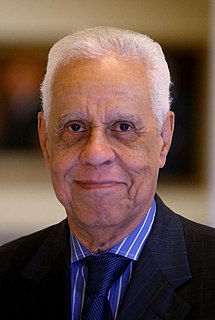A Quote by W. Kamau Bell
I keep trying to write the crowd-pleasing slavery joke and the crowd-pleasing reparations joke, but any time you mention slavery or reparations in any detail, it seems to bum lots of people out. That's a challenge I keep putting in front of myself.
Related Quotes
We've got to stand up at some point and say, 'We are not gonna pay slavery reparations in the United States Congress.' That war's been fought. That was over a century ago. That debt was paid for in blood, and it was paid for in the blood of a lot of Yankees, especially. And there's no reparations for the blood that paid for the sin of slavery.
Reparations, I believe, are talked about for political reasons, trying to cater for the purpose of getting votes. If Congress was serious about reparations - in '93 and '94 the Democrats controlled the House, the Senate and the White House, and not one single Republican vote was needed for reparations.
After you do a joke a few times, you have material that you know works. Although sometimes I have a joke that has worked a bunch of times and then one night it’ll flop. And that’s when I really take a hard look at myself and say: "Well, that crowd is obviously wrong. That crowd has absolutely no idea what it’s talking about."
After you do a joke a few times, you have material that you know works. Although sometimes I have a joke that has worked a bunch of times and then one night it'll flop. And that's when I really take a hard look at myself and say: 'Well, that crowd is obviously wrong. That crowd has absolutely no idea what it's talking about.'
Take Germany and Japan, both defeated in the Second World War. Germany has acknowledged its monstrous crimes to a certain extent, has paid reparations and so on. Japan, in contrast, apologizes for nothing and has paid no reparations, with one exception: It pays reparations to the United States, but not to Asia.
I have become a giant fan of the testing process, especially with a comedy. I mean, they tell you what's funny. It's almost tailor-made for people who shoot the way we shoot, trying a million different options and versions of things. Because the audience doesn't laugh at a joke, we put in another joke. If they don't laugh at the next joke, we put in another joke. You just keep doing them and you can get the movie to the point where every joke is funny, if you have enough options in the can.
As a preacher, I'm working with the crowd, watching the crowd, trying to bring them to that high point at a certain time in the evening. I let everything build up to that moment when they're all in ecstasy. The crowd builds up and you have to watch it that you don't stop it. You start off saying you've heard that tonight's going to be a great night; then you begin the whole pitch and keep it rolling.
































